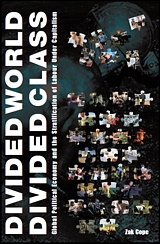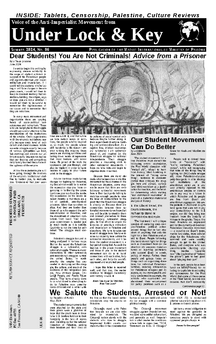
More on the Labor Aristocracy

Interestingly, it has been noted that Turning The Tide has taken on something of a Third Worldist veneer ever since some searing criticisms of Novick and his assessment of the Maoist Internationalist Movement by a USW comrade last year.(2) Despite TTT’s recent focus on the New Afrikan nation and their expressed support for the struggles of the oppressed worldwide, it is the underlying political line of Novick and company that we must really examine to see where we have unity. We understand that to the untrained eye, as well as to those new to revolutionary politics, the difference between the Maoist Internationalist Movement and the Amerikan left are less than apparent, so we will draw them out here for educational purposes as well as to defend against opportunists and social chauvinists of varying stripes; as without revolutionary theory there can be no revolutionary movement.
Novick calls on fans of egalitarian politics to take up critical thinking when it comes to the topic of global political economy and the stratification of labor under capitalism. However, he attacks and undermines Marxist political-economic analysis, the most critical and on point analysis of capitalism itself, without proposing anything in its place. He does this in the first few paragraphs of his article when he states that Dr. Cope comes to his conclusion that the First World labor aristocracy is bought off via “underlying Marxist assumptions of the labor theory of value”(1) and “through sometimes hypothetical formulations of what the value and price of that value ‘should’ be…”(1) He then states that Cope says, “the only workers who are ‘exploited’ are those who directly produce ‘surplus value’ in agricultural and industrial production of commodities.”(1) These lines imply a critique of Cope’s (and Marx’s) methods, but he does not say so outright or offer an alternative framework for such an analysis.(2) This is nihilism, and leads to subjectivism. Without an objective analysis as our guide we just let the masses do what feels right. We agree with Novick that to lame apologists of First World workers “Cope’s book is a very difficult read…”(1), but not because of the so-called “long sections of abstract mathematical calculations”(1) as Mr. Novick puts it, rather because bitter pills are always hard to swallow.
For those who are unaware, Novick claims to use dialectical materialism as a tool to analyze social phenomenon, yet this has not led him to the conclusion that the principal contradiction in the United $tates, or the world for that matter, is imperialism vs. the oppressed nations. Instead, Novick believes that capitalism never developed past its competitive phase, therefore it is his assessment that the principal contradiction on a world scale is still that of the bourgeoisie vs. the proletariat, or rather one between the so-called 1% and supposed 99% – itself a non-sensical and anti-scientific assessment. As such, Novick doesn’t believe that there are any oppressing or oppressed nations, only oppressed and oppressing classes; yet he denounces our “petrified defense of the principal contradiction.”(3)
Michael Novick also complains that “Cope essentially liquidates or obliterates class contradictions within both core and peripheral states”(1), but what Cope really obliterates is the First World’s romanticization of the labor aristocracy as anything but revolutionary with his scathing class analysis of First World workers. Novick also makes an empiricist error when he asserts that Dr. Cope’s analysis is no good to us in the United $tates because “his orientation and experience is primarily European”(1) hence his “understanding of settler colonialism and the existence of oppressed and colonized peoples within so-called ‘core’ countries as the US, Canada, etc. is limited.”(1) It is quite odd that Novick complains that Cope does not give us a complete class analysis of who are our friends and who are our enemies within the United $tates. Despite the fact that this book is about global imperialism, and written by a non-Amerikan, it spends a good amount of time explaining class and nation and the development of racism within the context of U.$. society, as it is today the heart of imperialism. Novick does not address the points made by Cope, only complains that it is too general. In addressing the discrimination and oppression faced by the disadvantaged in First World countries, Cope states that “economic betterment for people in the rich countries is today intrinsically dependent on imperialism.”(4) And that’s the rub right there. Whatever contradictions exist within imperialist society, apologists for the labor aristocracy like Novick must come to terms with that reality, or risk fanning the flames of militarism and even fascism.
A little further down Novick states that “classes and class relationships are based on material reality…”(1). This much is true, however, Novick takes us deeper into the jungle of idealism when he writes, “… but these are social phenomenon based on the element of consciousness and practice as well,”(1) emphasis on the element of consciousness. However, Marxist philosophy teaches us that in general it is social being that determines social consciousness, and not the other way around as Novick implies. He has a hard time reconciling the existence of revolutionaries in the United $tates and an analysis that labels the U.$. an exploiter country. For a dialectical materialist, this is no mystery. A more succinct explanation to the phenomenon and structure of class is given by Cope below:
“The term ‘class’ does not only refer to a social group’s relation to the means of production - that is, to property ownership or it’s absence and nor does it simply refer to any category relating purely to the technical division of labor at the societal or workplace level. Rather, class denotes a dynamic social relationship corresponding to the system of ownership, the organization of labour and the distribution of material wealth as mediated by ideological, cultural and political institutions and practices. Above all, class is the product of political practices, with the relationship between the state and class struggle revolving around the issue of class domination.”(4)
Not surprisingly it is always the ideological that is principal in matters of revolution when it comes to Amerikan “left” circles. And with that Novick ends his weak attempt to disprove the scientifically proven correctness of Zak Cope’s book. What then proceeds in his review is more existentialist questioning of both nation and class contradictions in the United $tates and the world when the answers are already readily apparent. Novick offers his persynal musings as proof positive to his readers that the class contradiction in the world is more important than the one of nation. But in order to deliver the people’s consciousness you can’t just answer the tough questions with more questions. Rather, you must deliver the people’s consciousness with revolutionary practice summed up in rational knowledge; as without revolutionary practice theory is meaningless. As such, Novick inadvertently proves the principal contradiction correct with his confused explanation of class contradictions in Amerika.
Something else that was disappointing in his review of Divided World was the complete omission of Cope’s thesis on how the First World petty-bourgeoisie, the labor aristocracy in particular, is a huge reservoir and potential breeding ground for fascism drawing from within the dispossessed petty-bourgeois class an army to smash the national liberation and socialist movements. This is odd since the majority of Anti-Racist Action’s work has previously been fighting the various neo-Nazi organizations currently attempting to re-organize on a massive scale. Perhaps we can surmise that Novick saw something else in Cope’s book that is damning and detrimental to First World “revolutionary and socialist” movements? Perhaps another bitter pill to swallow?
We highly recommend Divided World, Divided Class to up and coming revolutionaries and communist youth looking to get a firm grasp of First World labor and it’s dialectical relation to the real proletariat centered in the periphery.(5) Divided World, Divided Class does an excellent job of explaining the parasitic nature, as well as the fascist tendencies of the First World labor aristocracy.








